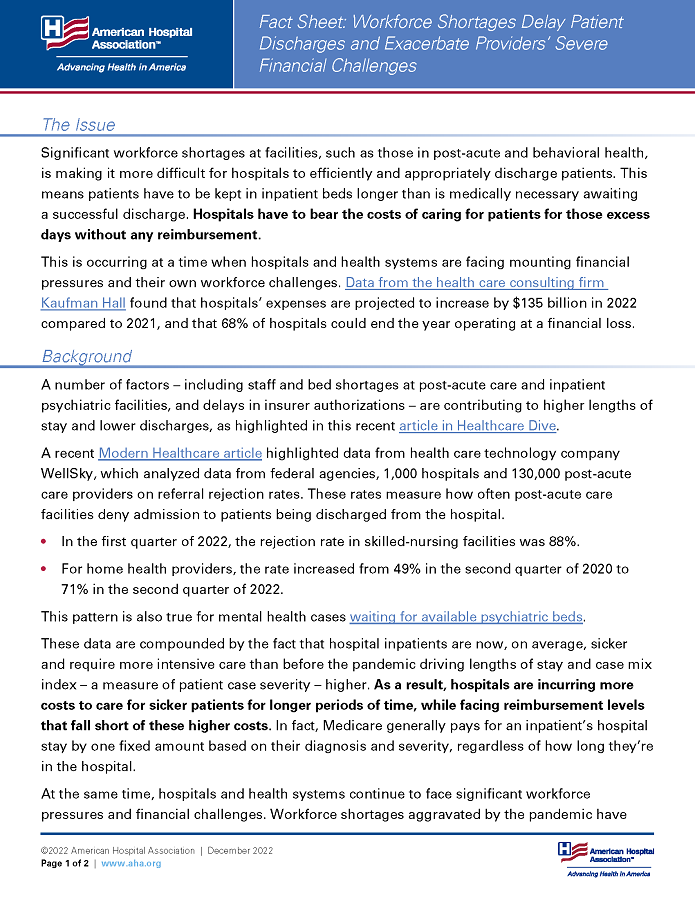
The Issue
Significant workforce shortages at facilities, such as those in post-acute and behavioral health, is making it more difficult for hospitals to efficiently and appropriately discharge patients. This means patients have to be kept in inpatient beds longer than is medically necessary awaiting a successful discharge. Hospitals have to bear the costs of caring for patients for those excess days without any reimbursement.
This is occurring at a time when hospitals and health systems are facing mounting financial pressures and their own workforce challenges. Data from the health care consulting firm Kaufman Hall found that hospitals’ expenses are projected to increase by $135 billion in 2022 compared to 2021, and that 68% of hospitals could end the year operating at a financial loss.
Background
A number of factors – including staff and bed shortages at post-acute care and inpatient psychiatric facilities, and delays in insurer authorizations – are contributing to higher lengths of stay and lower discharges, as highlighted in this recent article in Healthcare Dive.
A recent Modern Healthcare article highlighted data from health care technology company WellSky, which analyzed data from federal agencies, 1,000 hospitals and 130,000 post-acute care providers on referral rejection rates. These rates measure how often post-acute care facilities deny admission to patients being discharged from the hospital.
- In the first quarter of 2022, the rejection rate in skilled-nursing facilities was 88%.
- For home health providers, the rate increased from 49% in the second quarter of 2020 to 71% in the second quarter of 2022.
This pattern is also true for mental health cases waiting for available psychiatric beds.
These data are compounded by the fact that hospital inpatients are now, on average, sicker and require more intensive care than before the pandemic driving lengths of stay and case mix index – a measure of patient case severity – higher. As a result, hospitals are incurring more costs to care for sicker patients for longer periods of time, while facing reimbursement levels that fall short of these higher costs. In fact, Medicare generally pays for an inpatient’s hospital stay by one fixed amount based on their diagnosis and severity, regardless of how long they’re in the hospital.
At the same time, hospitals and health systems continue to face significant workforce pressures and financial challenges. Workforce shortages aggravated by the pandemic have left many hospitals with critical staffing shortages and all hospitals facing skyrocketing labor costs that are expected to increase by $86 billion in 2022 alone. In addition to increased costs of caring for patients who are not able to be discharged appropriately, hospitals also are contending with fewer beds and staff to care for patients who need acute care. The financial pressures are threatening access to care for patients as some hospitals have been forced to close beds, reduce emergency department capacity and curtail specialty care services.
Legislative Solution
Congress should establish a temporary per diem Medicare payment targeted to hospitals, including acute, long-term care, rehabilitation, and psychiatric, to ease capacity issues. Per diem payments should be made for inpatient cases identified and assigned with a specific discharge code that fall under such type of long stays where the patient is documented to be ready for discharge but is unable to be discharged appropriately. The solution could model after an existing per diem Medicare payment mechanism and be temporary with a cap on payments.
"severe" - Google News
December 06, 2022 at 12:25AM
https://ift.tt/iRJtAfP
Workforce Shortages Delay Patient Discharges and Exacerbate Providers' Severe Financial Challenges | AHA - American Hospital Association
"severe" - Google News
https://ift.tt/AXvNOEG
Shoes Man Tutorial
Pos News Update
Meme Update
Korean Entertainment News
Japan News Update
Bagikan Berita Ini















0 Response to "Workforce Shortages Delay Patient Discharges and Exacerbate Providers' Severe Financial Challenges | AHA - American Hospital Association"
Post a Comment